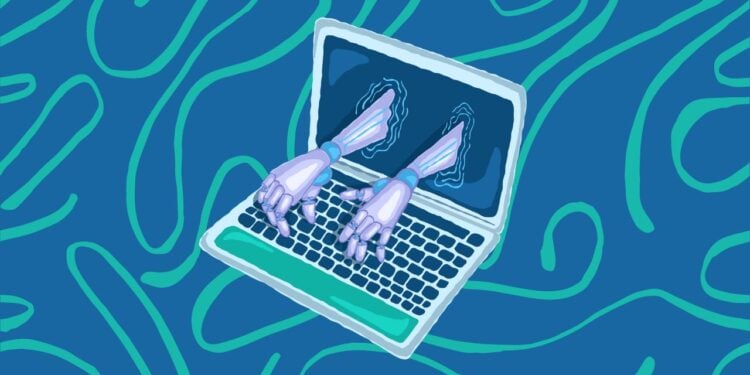- According to a recent INTOO report, 47% of Gen Z employees rely on AI tools over their managers to provide meaningful career guidance.
- The report highlights current expectations for more accessible and unbiased career support, and underscores the insufficient guidance managers provide.
- The future of mentorship involves integrating AI capabilities with human insights — allowing organizations to effectively meet the diverse needs and expectations of a tech-savvy generation.
Gen Z, the fastest-growing segment of the workforce, often feel directionless despite their potential to benefit significantly from learning and career development opportunities.
While workers have typically turned to workplace mentors such as their bosses or other senior staff members for guidance, Gen Z is placing their trust elsewhere — with AI.
Why Gen Z Feels Adrift
A recent survey conducted by INTOO in collaboration with Workplace Intelligence, which included 800 HR leaders and 800 full-time employees, revealed challenges employees face when managers provide insufficient support around career development.
The report showed a significant trend: 47% of Gen Z employees report receiving higher-quality career guidance from AI tools, such as ChatGPT, compared to their managers.
These tools are viewed as more accessible and unbiased than traditional workplace mentorship — reflecting a change in expectations toward immediate and personalized feedback.
These key findings from the survey highlight widespread feelings that career development is unsupported:
- 63% of employees believe their employer prioritizes productivity over career advancement.
- 54% feel completely isolated in their career growth.
- 25% of employees — and a concerning 44% of Gen Z — indicate they will likely leave within the next six months due to inadequate support.
While managers still play a role in facilitating career advancement, many employees feel they cannot rely on them for guidance:
- 46% report that their manager is unsure how to assist in their career development.
- Nearly 47% of Gen Z employees claim to receive better career guidance from AI than from their managers.
- Workers who feel even “somewhat”’ supported by their manager are nearly seven times more likely to report significant career progress than those who perceive minimal or no support.
Dan Schawbel, Managing Partner of Workplace Intelligence, states, “Only half of the HR leaders we surveyed say managers at their company receive training on providing career development guidance.”
Schawbel further emphasizes that around one third of employees discuss their careers only “once a year or never” with their managers. As Gen Z increasingly turns to AI for career advice, organizations must take note of these trends and adapt their mentorship practices accordingly.
What Emerging Trends Reveal About the Preference for AI Mentorship
The report highlights that nearly 50% of Gen Z prefer to consult AI for immediate, tailored, and impartial career guidance rather than seeking advice from their managers, raising the question: Why is Gen Z increasingly turning to AI for career mentorship?
A Preference for Immediate and Personalized Feedback
Gen Z’s inclination toward AI mentorship underscores a growing demand for immediate, personalized, and unbiased feedback. AI tools effectively bridge significant knowledge gaps by providing tailored mentorship, often lacking in conventional settings.
With 44% of Gen Z feeling unsupported in their career development, AI career guidance emerges as a viable option. The ability of AI to deliver precise, context-specific advice helps Gen Z employees make informed decisions and develop their skills more efficiently.
The Shortcomings of Managerial Support
The report reveals a stark reality: many employees, particularly those from Gen Z, feel unsupported due to inadequate training and guidance from their managers. Alarmingly, only half of HR leaders report that new managers receive training on providing impactful career development support.
This lack of preparation contributes to a significant mentorship gap, compelling employees to seek advice from alternative sources. Furthermore, a third of employees engage in career-related discussions with their managers only once a year — or not at all.
Higher Expectations for Learning and Professional Development
Gen Z’s demands for high-quality learning and development (L&D) opportunities further influence their preference for AI mentorship. Many workers prioritize robust L&D programs as essential to their career growth, often valuing these opportunities more than traditional promotions. Unfortunately, many companies frequently fall short of these expectations, leaving gaps that AI can fill.
AI’s Capacity to Identify Opportunities
In a recent Allwork.Space podcast, Angela Hood, CEO of ThisWay Global Inc., emphasized AI’s capacity to unlock human potential in the workplace. AI can enhance recruitment processes and effectively pinpoint skills gaps. Hood notes that AI tools can offer insights humans might overlook, helping employees discover career paths that align with their strengths and aspirations. Many Gen Z employees perceive AI as more accessible and unbiased than traditional mentorship.
“…AI understands correlations that we as people would not pick up on… It can remove blinders we have because it’s looking at so many data points that it makes relationships that we may be overlooking.” – Angela Hood, CEO of ThisWay Global
Merging AI with Human Guidance for Future Careers
According to the INTOO report, a significant workplace concern is the perceived lack of guidance from managers, raising issues related to talent retention. One promising solution is the integration of AI-driven and human mentorship to support younger generations.
By balancing the efficiency of AI with the nuanced understanding that only human mentors can provide, organizations can develop a more holistic approach to career progression.
The increasing demand for immediate, impartial, and customized feedback has prompted employees to seek more innovative career guidance options. Advanced AI tools can analyze extensive data sets to provide valuable insights into career progression, skill acquisition, and job market trends.
These tools enable employees to receive tailored advice that enhances their professional growth and competitiveness in a tech-driven job market. However, the human element of mentorship must be acknowledged — as it introduces empathy, contextual understanding, and personal connection to the guidance process.
Redefining Managerial Roles
Improving managerial training is imperative for AI and human mentorship to work in tandem. Effective training programs can empower managers to integrate AI tools into their mentoring practices, complementing the precision of AI with their own experience and intuition.
Furthermore, integrating AI into professional development requires reevaluating managerial roles. Organizations should ensure managers have the resources and skills to prioritize employee development and provide meaningful career guidance. Successful career development initiatives not only enhance the quality of mentorship but also align managerial responsibilities with the evolving expectations of the workforce, reducing reliance on AI alone for career guidance.
This approach ensures employees receive the necessary support to thrive without solely depending on technological solutions.
The Future of Mentorship
The future of mentorship lies in effectively merging AI capabilities with human insights. By leveraging the strengths of both digital and human mentors, companies can more readily address the diverse needs of their employees.
Organizations that adapt to the preferences and expectations of a technologically proficient generation will be better positioned to develop talent and retain a more engaged and capable workforce.


















